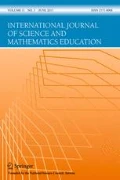ABSTRACT
A 44-item survey instrument was designed to determine secondary students’ views about how useful various specific actions related to reducing global warming might be, their willingness to undertake these various actions and the extent to which these 2 might be linked. The instrument was administered to students in grades 6 – 10 (n = 768) from 4 large schools in metropolitan Delhi, India in which the teaching language was English. The findings indicated that this cohort of Indian students exhibited high levels of concern about climate change and strong willingness to act against global warming and in favour of the environment. The findings are tentatively compared with those from 2 similar survey studies conducted in Western contexts (Spain and Australia).
Similar content being viewed by others
References
Ajzen, I. & Fishbein, M. (1980). Understanding attitudes and predicting social behaviour. Englewood Cliffs, NJ: Prentice Hall.
BBC (2006). US and India seal nuclear accord. http://news.bbc.co.uk/2/hi/4764826.stm. Accessed 16 December, 2009
Boyes, E., Skamp, K. & Stanisstreet, M. (2009). Australian secondary students’ views about global warming: Beliefs about actions, and willingness to act. Research in Science Education, 39(5), 661–680.
Bullard, R. (1993). Anatomy of environmental racism and the environmental justice movement. In R. Bullard (Ed.), Confronting environmental racism. Boston: South End Press.
Burgess, J., Harrison, C. & Filius, P. (1998). Environmental communication and the cultural politics of environmental citizenship. Environment & Planning A, 30, 1445–1460.
Cialdini, R. B., Reno, R. & Kallgren, C. (1990). A focus theory of normative conduct: Recycling the concept of norms to reduce littering in public places. Journal of Personality and Social Psychology, 58(6), 1015–1026.
Connell, S., Fien, J., Lee, J., Sykes, H. & Yenken, D. (1999). If it doesn’t directly affect you, you don’t think about it: A qualitative study of young people’s environmental attitudes in two Australian cities. Environmental Education Research, 5(1), 95–113.
Corraliza, J. A. & Berenguer, J. (2000). Environmental values, beliefs and actions, a situational approach. Environment and Behavior, 32(6), 832–848.
Devine-Wright, P., Devine-Wright, H. & Fleming, P. (2004). Situational influences on children’s beliefs about global warming and energy. Environmental Education Research, 10(4), 493–506.
Dietz, T., Stern, P. C. & Guagnano, G. (1998). Social structural and social psychological bases of environmental concern. Environment and Behavior, 30(4), 450–471.
Economic Survey of Delhi (2007–2008). http://delhiplanning.nic.in/Economic%20Survey/ES2007-08/C21.PDF. Accessed June 2010.
Elliott, J. (1999). Sustainable society and environmental education: Future perspectives and demands for the educational system. Cambridge Journal of Education, 29(3), 325–340.
Fien, J. (1993). Environmental education: Pathway to sustainability. Geelong, VIC, Australia: Deakin University Press.
Fishbein, M. & Ajzen, I. (1975). Belief, attitude, intention and behaviour: An introduction to theory and research. Reading, MA: Addison-Wesley.
Gandhi, M.K. (1928). Discussion with a capitalist. In The collected works of Mahatma Gandhi online 43, 412–413. http://www.gandhiserve.org/cwmg/VOL043.PDF. Accessed April 2010
Hungerford, H. R. & Volk, T. L. (1990). Changing learning behaviour through environmental education. Journal of Environmental Education, 21, 8–12.
Idso, S. B. (1998). CO2-induced global warming: A sceptic’s view of potential climate change. Climate Research, 10, 69–82.
Indian Express (2008). Report: Delhi has highest per capita income in country. www.expressindia.com/latest-news/report-delhi-has-highest-per-capita-income-in-country/286903/20. Accessed 16 December, 2009
Intergovernmental Panel on Climate Change (IPCC). (1997). Executive summary of the North American chapter on climate change. Cambridge, MA: Cambridge University Press.
Jensen, B. (2002). Knowledge, action and pro-environmental behaviour. Environmental Education Research, 8(3), 325–334.
Kefford, R. F. (2006). Medical heat for climate change. The Medical Journal of Australia, 184(11), 582.
Kelsey (2003). Constructing the public: Implications of the discourse of international environmental agreements on conceptions of education and public participation. Environmental Education Research, 9(4), 403–427.
Kollmuss, A. & Agyeman, J. (2002). Mind the gap: Why do people act environmentally and what are the barriers to pro-environmental behaviour? Environmental Education Research, 8(3), 239–260.
Kothari, S. & Parajuli, P. (1993). No nature without social justice: A plea for cultural and ecological pluralism in India. In W. Sachs (Ed.), Global ecology. London: Zed Books.
Nicholson-Cole, S. A. (2005). Representing climate change futures: A critique on the use of images for visual communication. Computers, Environment and Urban Systems, 29(3), 255–273.
O’Connor, J. (1989). Uneven and combined development and ecological crisis: A theoretical introduction. Race and Class, 30(3), 1–11.
Rajecki, D. W. (1982). Attitudes: Themes and advances. Sunderland, MA: Sinauer.
Rodriguez, M., Boyes, E. & Stanisstreet, M. (2010). Spanish secondary students’ willingness to undertake specific actions to combat global warming: Can environmental education help? Psyecology, 1(1), 1–17.
Sarabhai, K. V. & Chhokar, K. B. (2009). Environmental education in India: Evolution of education as a tool for sustainable development. In N. Taylor, M. Littledyke, C. Eames & R. K. Coll (Eds.), Environmental education in context: An international perspective on the development of environmental education (pp. 51–61). Rotterdam, The Netherlands: Sense.
Skamp, K., Boyes, E. & Stanisstreet, M. (2007). Global warming: Do students become more willing to be environmentally friendly as they get older? Paper presented at the 38th Annual Conference of the Australian Association of Science Education, Freemantle, Australia.
Stern, P. C. (1992). Psychological dimensions of global environmental change. Annual Review of Psychology, 43, 269–302.
The Economic Times, New Delhi (2009). Economic Survey of Delhi 2007–2008, http://delhiplanning.nic.in/Economic%20Survey/ES2007-08/C21.PDF. Accessed 12 September, 2009.
The Hindu (2004). Report: Changes in the Indian menu over the ages. http://www.hinduonnet.com/seta/2004/10/21/stories/2004102100111600.htm. Accessed 9 September, 2010
Yeung, S., Boyes, E. & Stanisstreet, M. (2004). Air pollution: The knowledge and attitudes of secondary school students in Hong Kong. International Research in Geographical and Environmental Education, 13(1), 21–37.
Author information
Authors and Affiliations
Corresponding author
Rights and permissions
About this article
Cite this article
Chhokar, K., Dua, S., Taylor, N. et al. INDIAN SECONDARY STUDENTS’ VIEWS ABOUT GLOBAL WARMING: BELIEFS ABOUT THE USEFULNESS OF ACTIONS AND WILLINGNESS TO ACT. Int J of Sci and Math Educ 9, 1167–1188 (2011). https://doi.org/10.1007/s10763-010-9254-z
Received:
Accepted:
Published:
Issue Date:
DOI: https://doi.org/10.1007/s10763-010-9254-z



